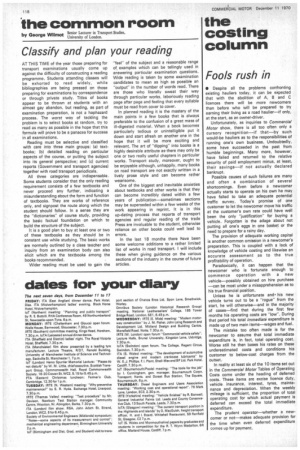costing column
Page 120

If you've noticed an error in this article please click here to report it so we can fix it.
Fools rush in
• Despite all the problems confronting existing hauliers today, it can be expected that with the abolition of A, 8 and C licences there will be more newcomers than before who will be prepared to try earning their living as a road haulier—if only, at the start, as an owner-driver.
Unfortunately, as inquiries to Commercial Motor show, there is all too often only a cursory recognition--if that—by such would-be hauliers as to the responsibilities of running one's own business. Undoubtedly, some have succeeded in the past from humble beginnings. Many more, however, have failed and returned to the relative security of paid employment minus, at least, their savings—if not actually declared bankrupt.
Possible causes of such failures are many and often a combination of several shortcomings. Even before a newcomer actually starts to operate on his own he may have failed to take an adequate potential traffic survey. Today's promise of one customer to let the newcomer move his traffic at the customer's own rate could have well been the only "justification" for buying a vehicle. Forgotten is the adage about not putting all one's eggs in one basket or the need to prepare for a rainy day.
The provision of adequate working capital is another common omission in a newcomer's preparation. This is coupled with a lack of knowledge of vehicle costing and likewise an accurate assessment as to the true profitability of operation.
Paradoxically, it can happen that the newcomer who is fortunate enough to commence operation with a new vehicle—possibly obtained on hire purchase —can be most under a misapprehension as to his true financial position.
Unless he is unfortunate and his new vehicle turns out to be a "rogue" from the start, he will otherwise—and in the majority of cases—find that during the first few months his operating costs are "low". During that period his total immediate expenditure is made up of two main items—wages and fuel.
The mistake too often made is for the newcomer to assume that total immediate expenditure is, in fact, total operating cost. Worse still he then bases his rates on these underestimated costs and conditions his customer to below-cast charges from the outset.
ln reality at least six of the 10 items set out in the Commercial Motor Tables of Operating Costs come under the heading of deferred costs. These items are excise licence duty, vehicle insurance, interest. tyres, maintenance and depreciation. When the weekly mileage is sufficient, the proportion of total operating cost for which actual payment is deferred can exceed the total immediate expenditure.
The prudent operator—whether a newcomer or not—makes adequate provision for the time when even deferred expenditure comes up for payment.






























































































































































